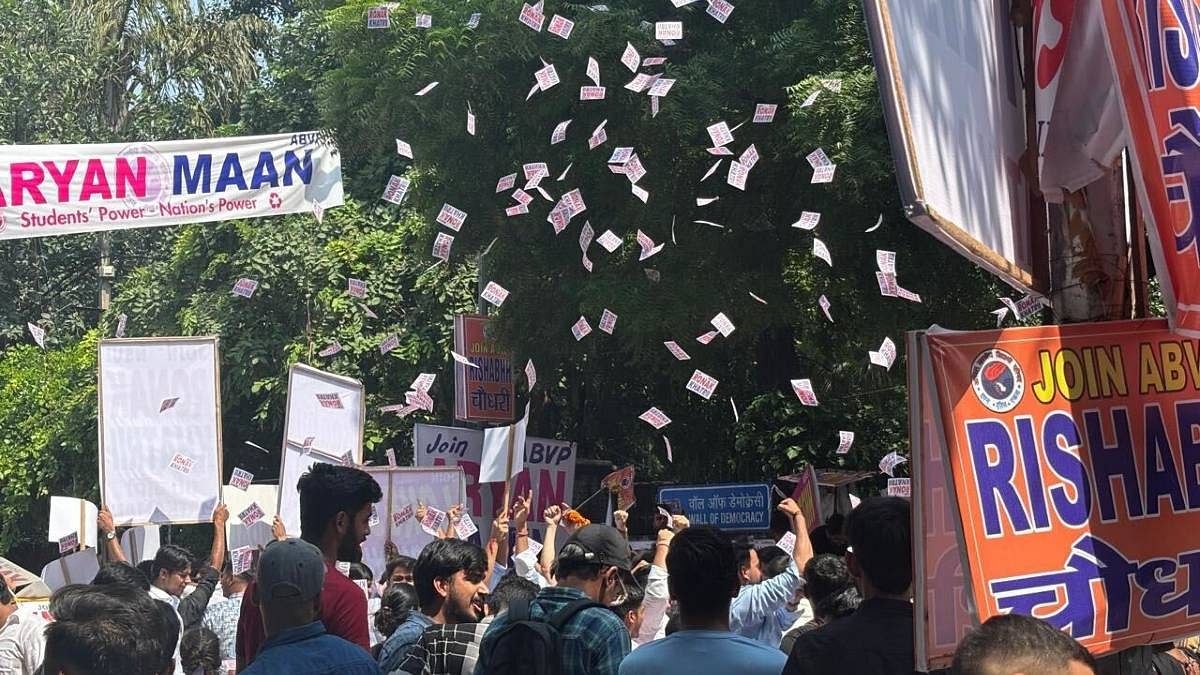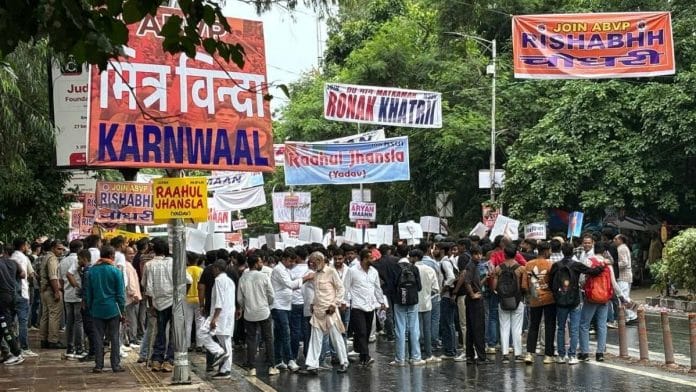New Delhi: As Delhi University gears up for its 2024 Students Union (DUSU) elections, three major student political groups are pushing for ambitious reforms around fee hikes, public transportation, and the construction of new hostels. But despite featuring several progressive issues in their manifestos, none of the parties have explicitly mentioned the concerns of the LGBTQIA+ community. They also did not address environmental issues.
Delhi University’s student body elections have long been a testing ground for the country’s political future, with student wings of national parties using this platform to demonstrate their strength.
Over the last 10 years, the elections have been dominated by Akhil Bharatiya Vidyarthi Parishad (ABVP), the student wing of the Rashtriya Swayamsevak Sangh (RSS), and National Students’ Union of India (NSUI), affiliated with the Congress party.
This year, the Left-wing All India Students Association (AISA)-Students’ Federation of India (SFI) alliance is positioning itself as a progressive alternative, focusing on affordable education and social justice.
All three campaigns have promised to address pressing concerns for students, including fighting fee hikes, securing concessional metro passes, building new hostels, introducing rent control, and establishing fully operational Internal Complaints Committees (ICCs) along with gender sensitisation cells across the university.
Also Read: How DU’s once-‘notorious’ ARSD dethroned LSR in NIRF rankings by improving its science programme
Student wellness & gender sensitisation among priorities
ABVP, which won the presidency in last year’s elections, is prioritising student wellness this time. The group is pushing for better mental and physical health resources, such as gynaecologists and mental health counsellors on campus. It also continues to advocate for reduced fees and more hostel allocations.
“Our manifesto reflects the needs and suggestions of thousands of students,” said ABVP joint secretary candidate Aman Kapasiya.
NSUI, meanwhile, made headlines by promising 12 days of menstrual leave for women students, part of its broader platform for improving gender equality on campus.
“Our manifesto reflects a comprehensive approach to address all issues related to student welfare,” said NSUI national president Varun Choudhary. The party also backed policies for affordable education.
Both NSUI and ABVP have addressed women’s empowerment in their campaigns. NSUI released a special manifesto for women students, while ABVP promises to work towards more than 50 percent representation of women in future elections.
However, both parties have only one woman candidate running for secretary post, and less than half of the total candidates are women.
“Leadership quality is vital for competing, and we will work towards empowering women in the upcoming period,” said ABVP presidential candidate Rishabh Choudhary.
In a significant development, two left-leaning organisations—AISA and SFI—have come together to challenge the ABVP and NSUI.
Their platform emphasises social justice and affordable education, with a focus on greater student representation in decision-making processes. They are advocating policies that benefit the economically marginalised students and address social inequalities on campus.
“This movement unites women from different sections of society, and I am committed to ensuring gender justice is at the forefront,” said alliance presidential candidate Saavy Gupta.
‘Entire election is hyper-masculine’
However, none of the manifestos explicitly address the concerns of the LGBTQIA+ community, despite growing awareness and activism around queer rights on campus. Their issues such as gender-neutral facilities, mental health resources for LGBTQIA+ students, and plans for their safety and inclusion are absent from the campaigns.
When asked about this, NSUI presidential candidate Ronak Khatri said, “Regarding LGBTQ+ community support, we will work towards whatever the Supreme Court directs us to.”
Meanwhile, ABVP’s Choudhary expressed support for the community and the Pride Parade but failed to expand on any specific plans for further inclusion.
Simran, who is completing her Master’s in English and is the head of the DU queer collective society, said the entire election is “hyper-masculine”, which is uncomfortable for the community. “The entire environment of the campus is very binary coded and explicitly queer phobic, there is an absence of a sense of belonging in the campus.”
“The primary issue for queer students is to be acknowledged and recognised. We want a union that will push the university to collect concrete data on the social demography of its students. We also demand proper sanitary facilities like gender-neutral washrooms and adequate representation,” she added.
Senior Professor Rajesh Kumar of Delhi University said, “The union should provide a safe atmosphere for all students, regardless of their identity. There are no sufficient sanitary facilities for transgender students on campus. We need clean gender-neutral restrooms. There has been a sentiment of hatred against these communities for a few years, and we must eliminate it.”
No plans for sustainability
There also appeared to be little regard for the environment in both the campaigns and the manifestos.
DUSU elections have historically shown little regard for sustainability with rampant paper wastage as student groups flood the campus with posters, leaflets, and banners during the campaigns. This time too, none of the parties have proposed any specific plans addressing sustainability.

Saavy Gupta said that their campaign had tried to limit paper use. On the broader issue of sustainability, Gupta said, “We will definitely work for it.”
On the other hand, ABVP presidential candidate Chaudhary dismissed the premise that they use large amounts of paper during the campaign. He also claimed that they use recycled papers and chart sheets for the campaigning.
Associate Professor Dr Justin Mathew from Hansraj College, who is also the convenor of the Hansraj Environment Society, criticised the election campaigns for causing environmental degradation.
He said that while the University Grants Commission (UGC) has introduced environmental studies in the first and second years to raise awareness about sustainability, the campaigns are antithetical to these efforts. “Students from various parties litter the campus daily with postcards made of microplastics, which are harmful to the environment. They also burst crackers and block roads, leading to severe traffic and pollution” he remarked.
Among other issues, the ABVP has also proposed organising a placement fair at the University level, coordinated by the central placement cell. They vowed to work closely with both the central and college-level placement cells to benefit students.
Their plan also includes conducting workshops and providing internship opportunities across various fields such as academics, research, arts, service, environment, social media, law, management, and journalism. Meanwhile, NSUI has emphasised enhancing the central placement cell’s efficiency to ensure better placement opportunities for students.
Students cite security concerns
While some students enjoy the atmosphere of the election season, others are not impressed.
“I enjoy the atmosphere on North Campus around election season. The campaigns, posters, and slogans are all quite interesting. It makes you feel like something big is happening,” said a third-year BSC biological science student at Ramjas College, asking not to be named.
A first-year BSC student from the college disagreed. “Honestly, it’s too loud. Classes are disturbed, and it’s difficult to concentrate with all the yelling and turmoil outside.”
According to Shreyashi Kashyap, a first-year master’s student at the Faculty of History, “It’s no longer about genuine concerns or representation. These elections have become a contest of who can flex the greatest muscle and generate the most hype. It’s about power and hooliganism rather than student voices.”
Some also cited the security concerns. A 20-year-old bachelor’s programme student from Hansraj College said, “Whenever we have to go somewhere and these parties are holding a rally, we feel unsafe because there are so many people and we don’t know if everyone is from our university.”
Voting for the Delhi University Students’ Union will take place on September 27 with the results to be declared the following day.
Vartika Singh is an intern with ThePrint
(Edited by Sanya Mathur)






